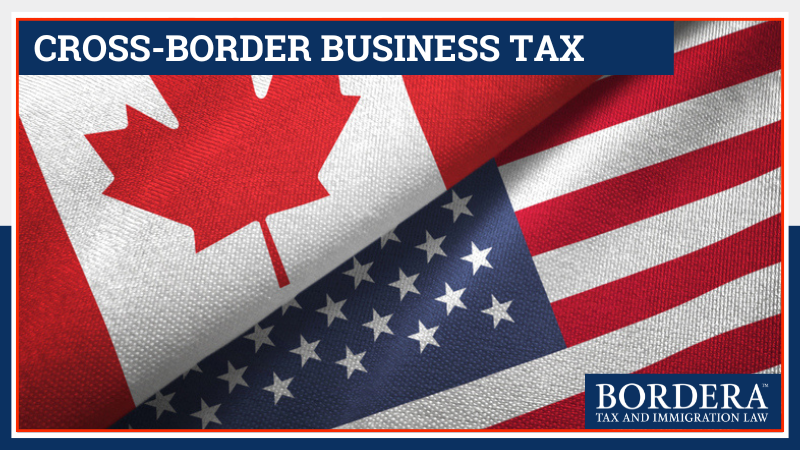
As Canadian businesses continue to seek growth opportunities, the U.S. market often represents a lucrative option. However, expanding into the United States can be complicated—especially with the tariffs imposed during Donald Trump’s presidency still affecting cross-border trade. In this guide, we will explore practical tax planning strategies for Alberta-based businesses looking to avoid tariffs and reduce their tax burdens when expanding into the U.S. market. The U.S. tax lawyers at Bordera Tax and Immigration Law have the experience and expertise to help businesses navigate the complexities of U.S. tax law while positioning themselves for success. Contact Bordera Tax and Immigration Law for expert advice on expanding your business into the U.S.
Under President Trump’s administration, several tariffs were imposed on Canadian goods, particularly in sectors like steel, aluminum, and agriculture. For Canadian companies looking to enter the U.S. market, these tariffs have presented a barrier to growth. While some tariffs were temporarily lifted, they continue to affect many industries, making it more expensive for Canadian businesses to export products across the border.
Rather than simply absorbing the added cost, many businesses are considering the benefits of expanding their operations directly into the U.S. to bypass the tariffs altogether. By establishing a presence in the U.S., Canadian businesses can benefit from local production and sales, often avoiding tariffs that would otherwise apply to imported goods. Setting up shop in the U.S. also makes it easier for American businesses as they don’t have to think about tariffs.
The key to successful expansion into the U.S. is strategic tax planning. U.S. tax law can be daunting for Canadian businesses, but with the right planning, companies can take full advantage of tax breaks, incentives, and deductions that may offset some of the costs of doing business south of the border.
One of the first decisions a Canadian entrepreneur will face when expanding into the U.S. is which business structure to choose. There are many options from limited partnership and Limited Liability Companies (LLCs) to corporations and business trusts.
An LLC is often preferred within the U.S. due to its flexibility and favorable tax treatment as a flow-through entity like a partnership. For Canadian businesses, LLCs only work in certain circumstances and have added complexity with managing tax reporting at the state level. The Canada Revenue Agency (CRA) does not tax LLCs the same way as the IRS and this can lead to double taxation.
Corporations offer the benefit of limited liability and are treated the same by the CRA and the IRS so they are better suited for cross-border enterprises. With the Tax Cuts and Jobs Act, passed in 2017, corporations operating in the U.S. are taxed at a flat rate of 21 percent. In some cases, corporations can simplify tax compliance and reporting which is an important factor when considering that penalties for international tax reporting can start at $10,000 per form.
Every state in the U.S. has its own tax regulations, and some states are more tax-friendly than others. States like Texas, Wyoming, and Nevada offer low or no state income taxes, which can significantly benefit a Canadian business setting up shop in the U.S. also makes it easier for American businesses to buy your products or services as they don't have to think about tariffs.
In addition to favorable state tax policies, many states offer tax credits to encourage business growth. For example, companies that expand into certain states might be eligible for credits on things like employee hiring or capital investment. A good tax advisor will help you understand which state’s tax regime will best suit your expansion goals.
The U.S. and Canada have a tax treaty that helps prevent double taxation, ensuring that businesses aren’t taxed on the same income in both countries. For Canadian businesses operating in the U.S., this treaty provides a valuable opportunity to minimize tax liability and streamline reporting.
With the right guidance, Canadian businesses can take advantage of specific provisions within the treaty to reduce withholding taxes on cross-border payments, such as dividends and interest. The U.S.-Canada Tax Treaty can also provide relief from certain U.S. estate taxes, which is important for businesses planning long-term investment strategies.
When expanding to the U.S., Canadian business owners must ensure compliance with both Canadian and U.S. tax laws. This includes filing U.S. tax returns, understanding the Foreign Account Tax Compliance Act (FATCA), and meeting state specific reporting requirements such as the margin tax in Texas and Business and Occupation tax in Washington state.
Working with a cross-border tax expert like Bordera Tax and Immigration Law ensures that you remain compliant with all the necessary tax filings in both countries. A well-executed tax strategy can mitigate the risks of penalties and audits down the road.
Expanding your business into the U.S. is an exciting opportunity, but it requires careful planning to avoid tariffs and minimize tax burdens. By choosing the right legal structure, understanding state-specific regulations, and leveraging the U.S.-Canada tax treaty, you can ensure your business is set up for success in the U.S. market.
If you're a business owner in Calgary or Edmonton considering expanding into the U.S., now is the time to consult with Bordera Tax and Immigration Law. Our team of experts, including Kevin Kirkpatrick and Azam Rajan, specialize in cross-border tax and immigration law, offering tailored advice to help you navigate U.S. tax structures and ensure compliance every step of the way. Contact us today for expert advice on expanding your Canadian business into the U.S. market.
The U.S. offers a larger customer base, potential tax benefits, and a way to avoid tariffs on Canadian exports by operating domestically. Contact Bordera Tax and Immigration Law for expert advice on expanding your Canadian business into the U.S. Market.
By establishing operations within the U.S., businesses can produce and sell goods locally, bypassing import tariffs that apply to cross-border shipments.
Corporations are typically preferred over LLCs due to more favorable treatment under both U.S. and Canadian tax laws, reducing the risk of double taxation.